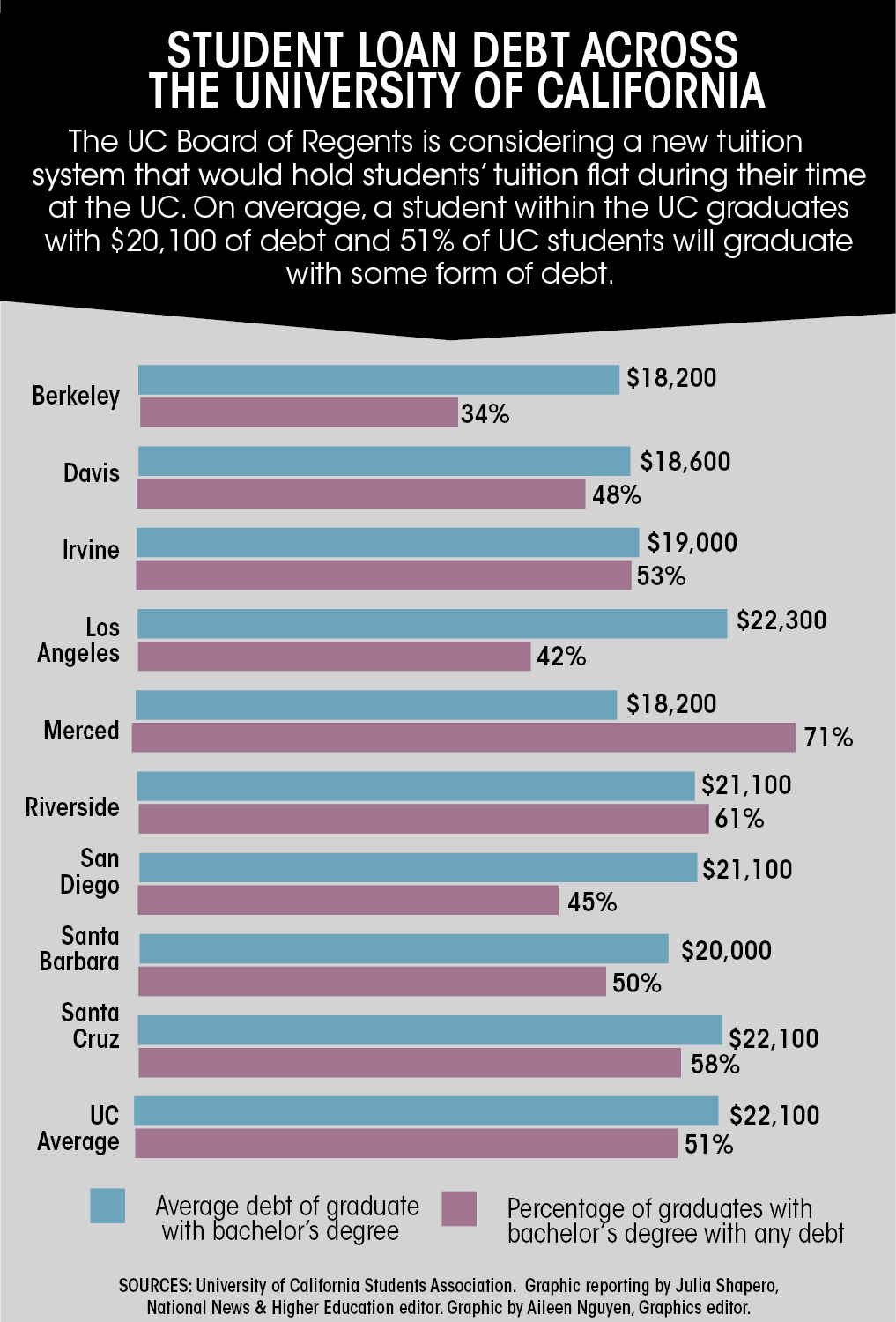UC considering new tuition model to keep rates flat during college

By Alexis Duke
Oct. 16, 2019 1:00 a.m.
The University of California is considering a new tuition model that would guarantee a fixed tuition rate for students during their time in college.
This cohort-based tuition model would keep base tuition, student services fees and nonresident supplemental tuition flat for undergraduates while applying increases to incoming cohorts of students, UC spokesperson Sarah McBride said in an email statement.
The UC Board of Regents began discussing the new tuition model at its July meeting.
The current tuition model allows tuition to stay flat for many years at a time, but may occasionally see large increases based on the availability of state funding, making financial planning difficult for UC students, families and campuses, according to an agenda item from the July regents meeting.
Flat tuition also results in a lack of funding for the UC’s primarily tuition-funded financial aid program.
The cohort-based model is meant to address these issues by promising a fixed set of fees for a cohort of students while also predictably raising tuition, according to the agenda item.
The UC said in the agenda item that the new model will help circumvent some of the problems with budgeting in the current model. Scheduled increases in tuition will also generate increases in financial aid.
The regents created a temporary group in August to evaluate the implementation and effects of the cohort-based tuition model. Members will be considering projected impact on students, affordability for students of different income levels and the resulting revenue generated to support instruction, student services and other programs, McBride said in an email statement.
UCLA students and faculty have divided opinions about the new tuition model.
Patricia Gandara, co-director of research group The Civil Rights Project and an education professor at UCLA, said she understands the intent but believes the proposed tuition model isn’t the best solution to making education more accessible.
“For a very long time, higher education leaders in California as well as other places have seen stability of tuition as a key issue for the system, because we understand that it’s very hard and upsetting for families to suddenly find that their budget isn’t going to stretch to new increases,” she said.
Stable funding from the state is also important for supporting a cohort-based tuition model, according to the regents’ agenda item. However, Gandara does not think state funding will be long-lasting, which will limit the plan’s effectiveness in the long run.
“It’s one thing to take on something like this from the position of the University of California, but it’s quite another if the funding coming from the state is not stable and predictable,” she said. “That’s exactly why over time, we run into these problems of having to suddenly raise tuition excessively because the state is not paying its share.”
Gandara said the Democratic-controlled state legislature and Gov. Gavin Newsom may commit to funding this tuition model in the short term, but predicting state finances in the long run is difficult.
She added she thinks enacting this plan may promote inequity since students getting the same education may be paying different amounts.
“If (two) students are receiving the same education, sitting in the same seats, in the same classes, yet one of them is paying a lot less than the one sitting next to them, I think that invites questions of equity,” she said.
Gary Orfield, co-director of The Civil Rights Project and an education professor, said he thinks if the state prioritizes setting aside funds from the current surplus for the cohort-tuition plan, the tuition increases will be predictable and eventually benefit families.
“I think the predictability is a good thing,” he said. “It’s not a perfect solution to the problem, but it’s better than not knowing what is going to happen next.”
Orfield added he thinks the tuition increases for incoming cohorts are worth the predictable tuition increases, since students can get hit with a large increase in the middle of their education under the current tuition plan. However, he said he believes the state should be taking greater action to support students.
“Right now, tuition is too high and the state isn’t willing to invest enough in the university,” Orfield said. “What really should be happening is there should be a big movement for more support for students and for higher education in general.”
Anusha Goyal, a third-year geography student, said she thinks the discussion around tuition can be deceiving when the university fails to publicize increases in non-resident tuition.
She added she supports cohort-based tuition because a fixed tuition would help her family plan their finances better.
“I agree with it purely on the fact that my parents saved to send me to college,” she said. “And the fact that (tuition) changes for them is harder for them to save up for. We can’t properly infer how much money we’re going to need to pay for college.”
The regents will reconvene in November to further discuss the cohort-based tuition plan and other options for tuition policy, McBride said in an email statement.


